Or – “An Issue That Always Brings A Tear To My Eye…”
Back in the early 1970s, Joe Simon (creator of Captain America, among other credits) returned to DC Comics to create the bizarre tale of the first teenage president of the United States of America. Twenty years later, Neil Gaiman took that concept to its logical conclusions, and created one of the most touching tales of the modern era. Your Major Spoilers (retro) review awaits!
SUMMARY
Pros
Gorgeous Allred art…
You gotta love the Prez.
Cons
I can’t read this story without being consumed with existential sadness and ennui…
READER RATING!
[ratings]  SANDMAN #54
SANDMAN #54
Writer: Neil Gaiman
Artist: Bryan Talbot/Michael Allred
Inker: Mark Buckingham/Michael Allred
Colorist: Daniel Vozzo
Letterer: Todd Klein
Editor: Karen Berger
Publisher: Vertigo/DC Comics
Cover Price: $1.95
Current Near-Mint Pricing: $4.50
Previously in Sandman: The Sandman is one of many names for Morpheus, the dream king, one of the seven Endless, immortal personifications of the constants of the universe. As the king of dreams, he is also prince of stories, and many lives rotate in and out of his story. Though no one yet knows why, reality has been turn asunder by a terrible storm, with time and space losing their meaning, and refugees from many varied places seeking shelter in an inn known as ‘Worlds’ End.’ One of those is Brant Tucker, a young man who comes from a world very much like our own, and has little idea what might actually be happening outside the inn. After a long day of tales, Brant has finally slept, but upon awakening, finds that the stairwell he remembers is now a reading nook, with a strange man inside. As they get to know one another, Brant is a bit surprised at the line of questioning…
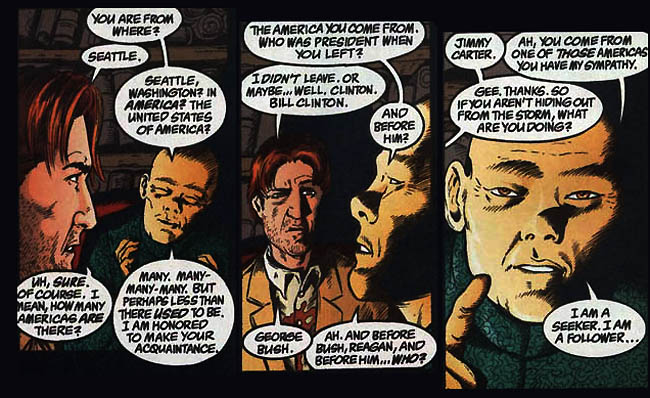
As has been happening since he arrived at Worlds’ End, Brant Tucker once again finds himself hearing a story, this one a tale of a world much like our own, but with a few key differences…
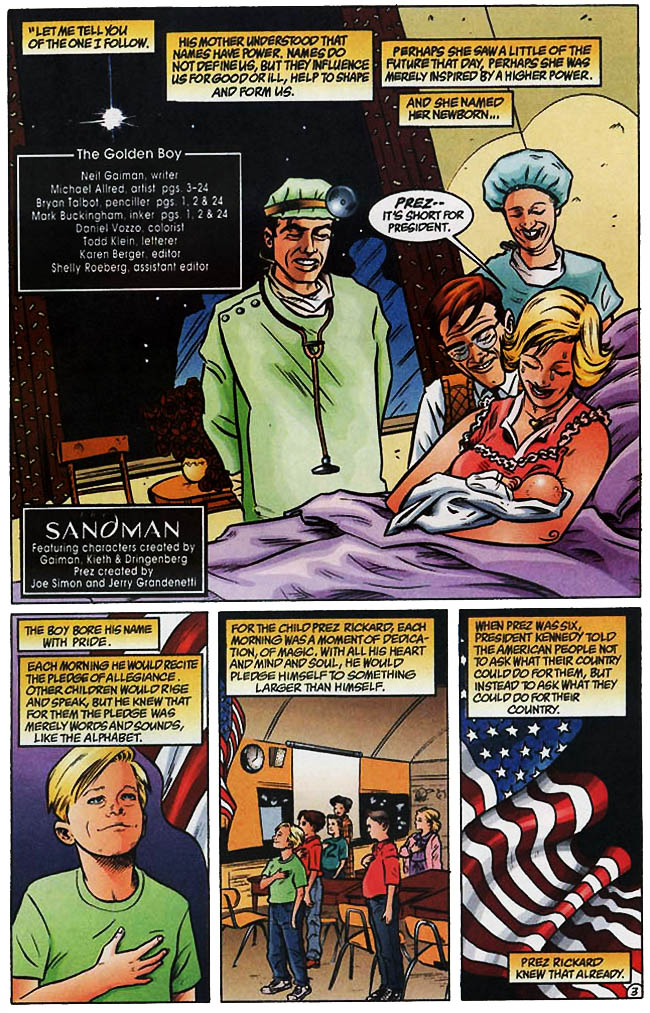
I’ll admit it: Prez is a pretty silly concept, and I say this as one of the book’s (and the creator’s) biggest supporters. The idea of a teenager becoming the President of the United States is unapologetically goofy, but it’s also a story with great power in it, and Neil Gaiman is perfectly aware of the notion’s iconic potential. Growing up in the town of Steadfast, Prez became notorious after finally fixing all the town’s various clocks to give the same time. Soon after his 18th birthday, Prez is visited by the mysterious Boss Smiley, power-broker of ill-repute…
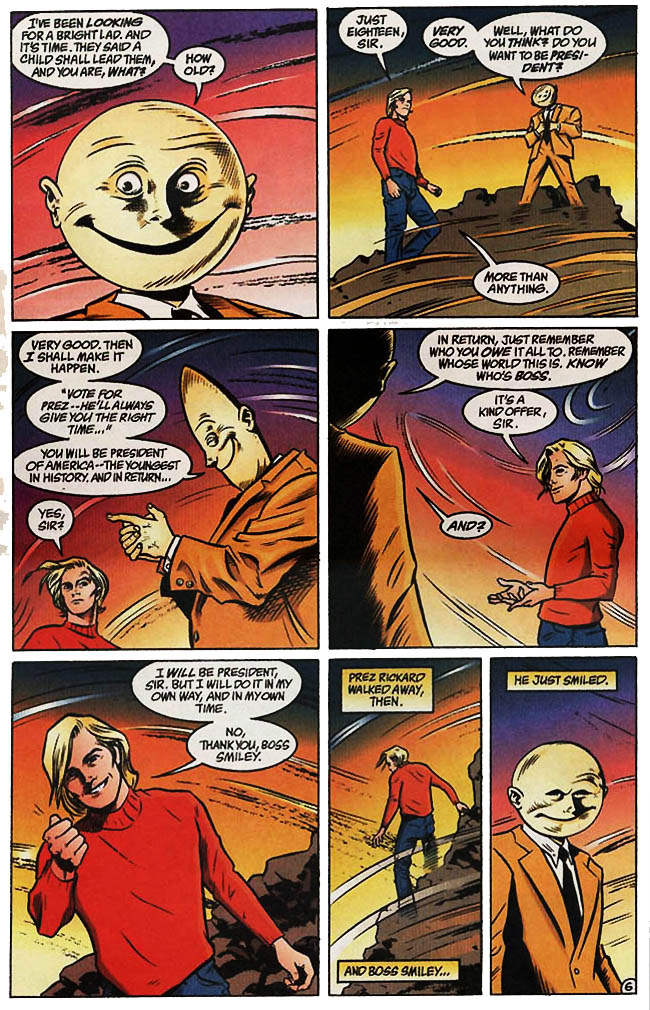
The neatest part of all of this is how Gaiman takes the events of Simon’s Prez #1 and turns it into a mythic tale, a story of giants striding the earth, taking what might have been silly and making it awe-inspiring. Gaiman’s strengths as a writer work to the story’s advantage as well, an economy of storytelling that amplifies it all. Case in point: “Prez woke one night to find the President of the United States in his bedroom…”
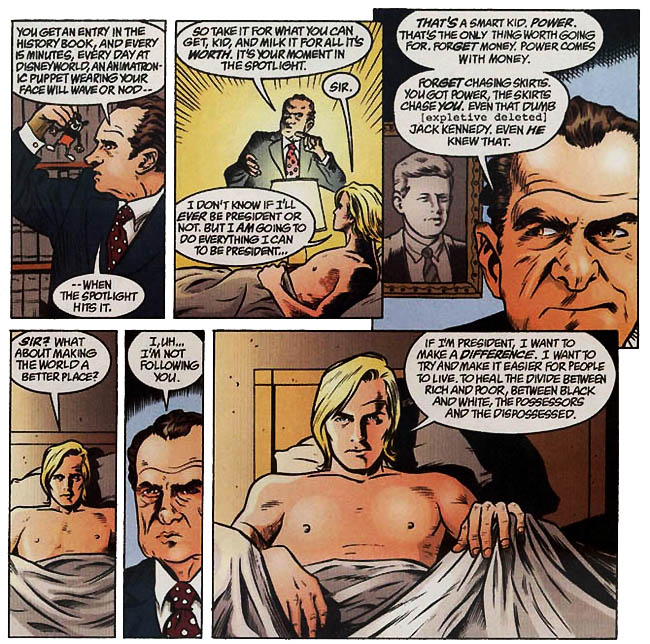
The use of Nixon (at the time of this story, a still-living public figure) as the voice of cynicism is fascinating (especially given that he resigned from office within months of the publication of the original Prez #1) and serves to balance out the idealism of the young would-be President, without making either of their political positions ridiculous. And, of course, as his name would have it, Prez won the highest office in the land…
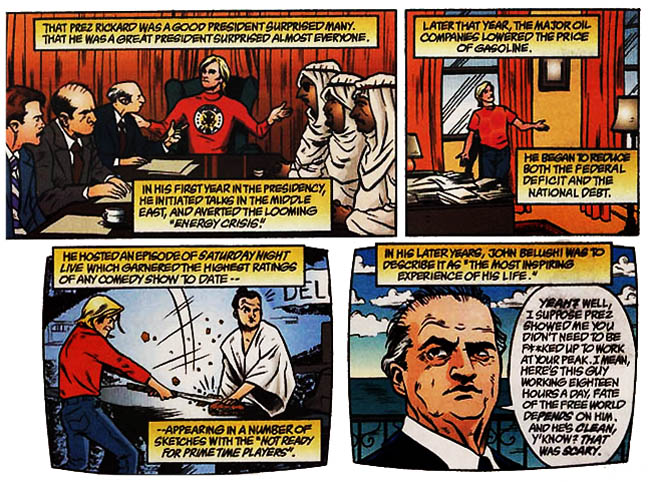
In many ways, Prez’s world is a wonderful land indeed, with Belushi surviving to a ripe old age and the oil crisis ameliorated. There are messianic elements here, with echoes of religious fervor (and the occasional wholesale chunk of Christian philosophy) but also an undertone of Clinton, Kennedy and a bit of Superman here and there. Of course, no epic tale of heroism can ever be without tribulations. As the 70s wore on, even Prez felt the strain of his position weighing on him, a situation made a little bit better by renewing his relationship with his high school sweetheart, a girl named Kathy…
It is here that his story turns tragic.
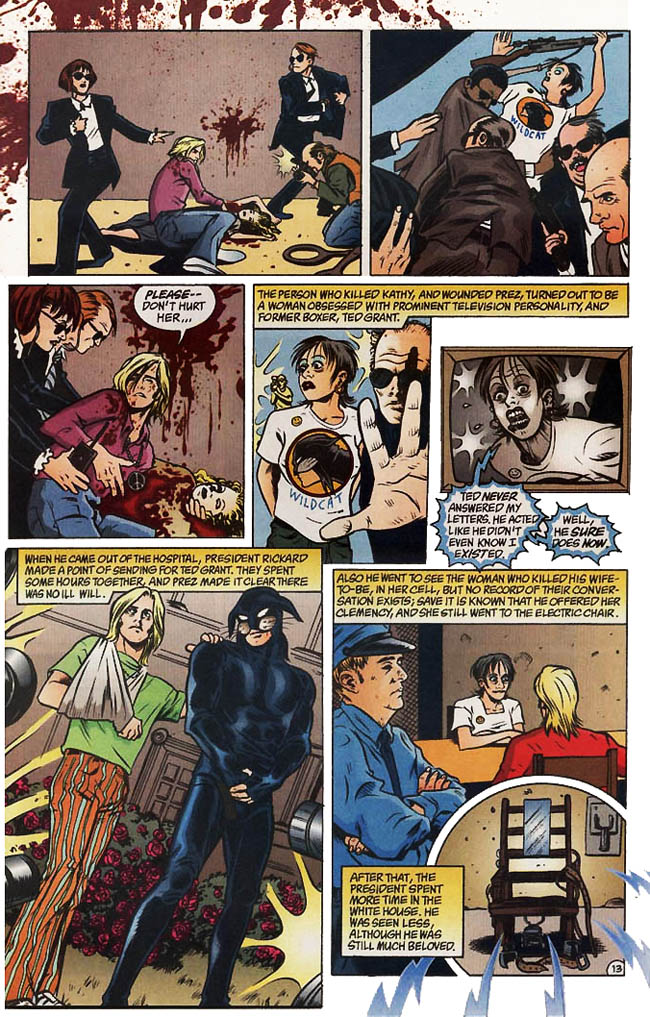
I am so incredibly jealous of Neil Gaiman as a writer, and this issue is a big reason why, but these pages also feature a virtuoso performance by Mike Allred, showing off a wonderful Joe Simon pastiche in early pages, but subtly changing the face of Prez Rickard a little at a time, aging the character a little bit at a time, showing the strain of the Presidency on him. After Kathy’s murder, Boss Smiley arrives to taunt him, offering to return her to life and Gaiman wisely keeps the story ambiguous as to whether the character is dreaming or not. Prez finishes his second term of office, and retires to his home in Steadfast, and when his successor asks him to step back into a political life…
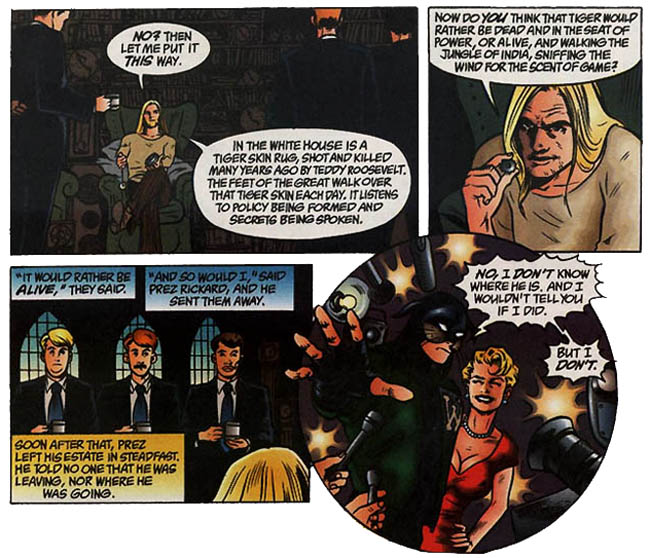
The story that Brant hears (that Neil and Mike are simultaneously telling us, very meta) has elements of the superhero in it, but isn’t a superhero story, in that Prez Rickard is allowed an ending…
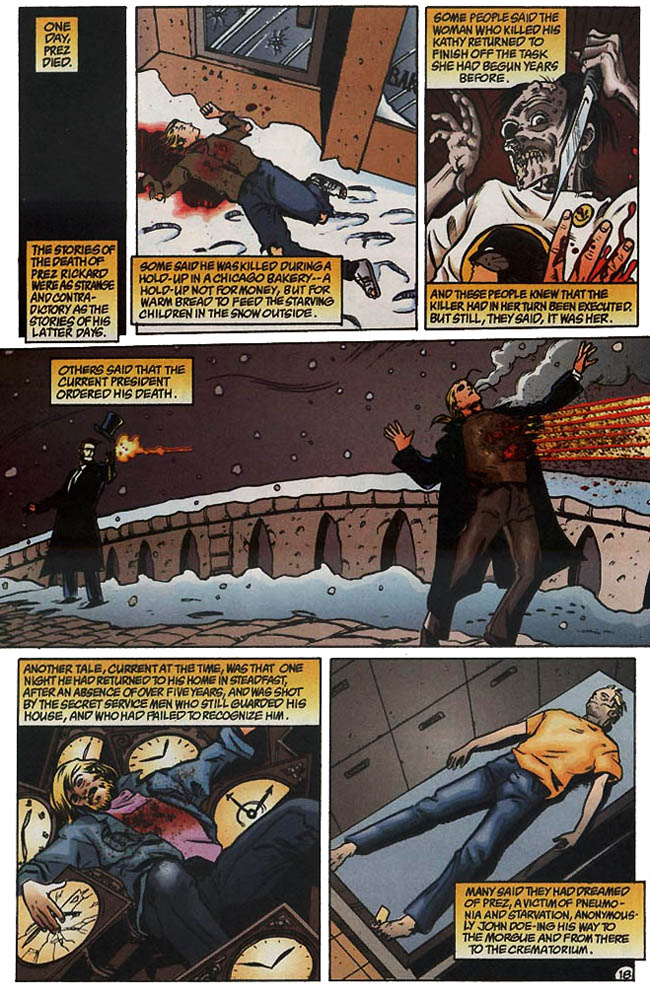
…or to be more accurate, endings. As with any good myth, though, there’s a little more story left to tell. “Let us say,” the man tells Brant, “that this is what *I* believe happened to Prez after he died.” Escorted into the afterlife by Death of the Endless, Prez meets Boss Smiley, who claims to be his maker, and tries to once again convince Prez to swear servitude to him. Prez, on the other hand, is fascinated by the idea that there are OTHER worlds…

Fortunately, Death called in her big brother concept, and Morpheus is in no way intimidated by Boss Smiley’s theatrics. (And, yes, it’s almost always that hard to read his white-on-black dialogue.) Even though it’s his book, Morpheus only come in at the very end, and even then his only action is to ensure that Prez has the freedom to do what he knows he must: Seek out and find other Americas that need his help.
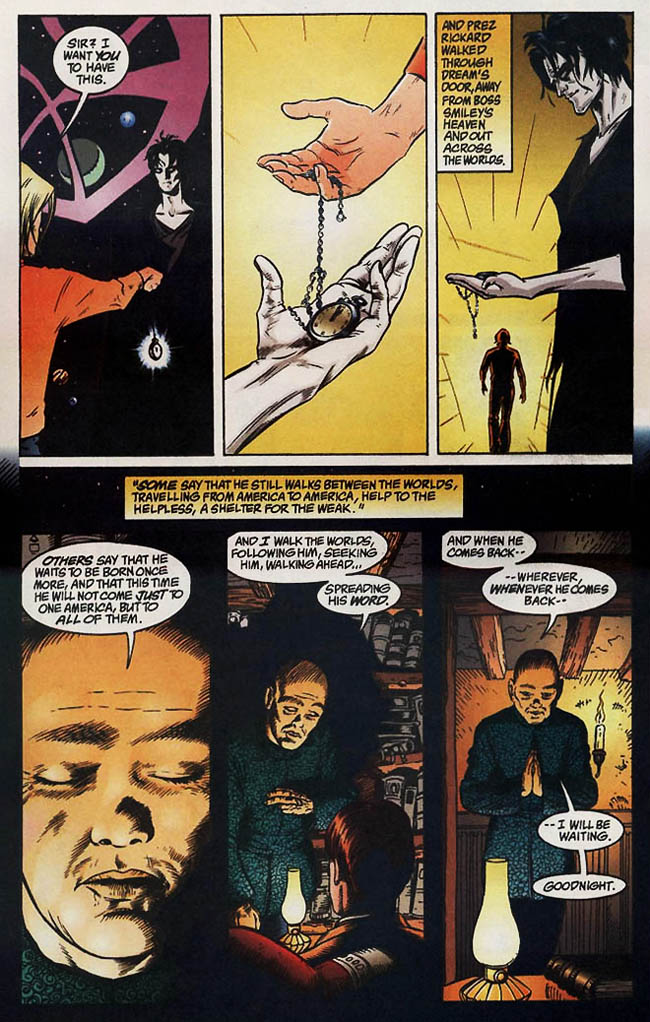
Worlds’ End is a fascinating book, one that I recommend in its entirety, as every issue works as both stand-alone and part of the collection, and each is focused on the nature (and the telling) of stories. Notably, there is an issue wherein we are told a tale during which a character stops to tell a tale of when a character stopped to tell a tale of when a character told her a tale, and Gaiman keeps the whole thing on even keel all the way through.
This issue is something truly wonderful for me, taking an abandoned DC Universe concept (as he had done previously with Cain & Abel, Destiny, and even parts of Morpheus’ own backstory) and looking at it in ways that no one ever had before, turning what was a laughingstock into an utterly fascinating and mythical construct, and making what once seemed like a silly concept into an incredibly personal and touching story. Sandman #54 gives Prez the respect that nobody knew he had always deserved, and serves as an example of how to craft a masterful single issue, earning 5 out of 5 stars. Honestly, though, this whole SERIES is pretty brilliant…




1 Comment
First and foremost, I LOVED the Sandman.
Secondly, this story was part of what I believe is my favorite story arc.